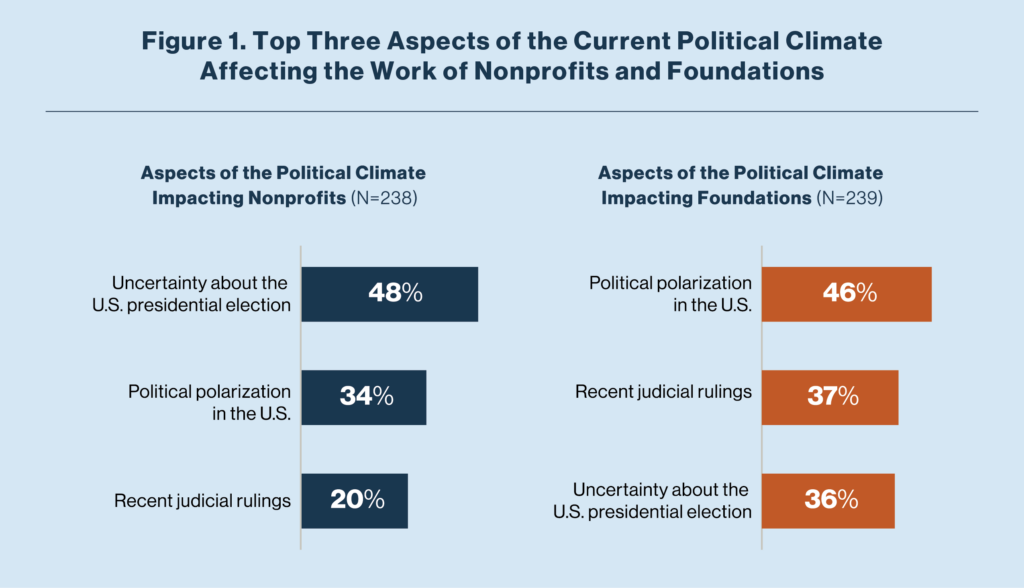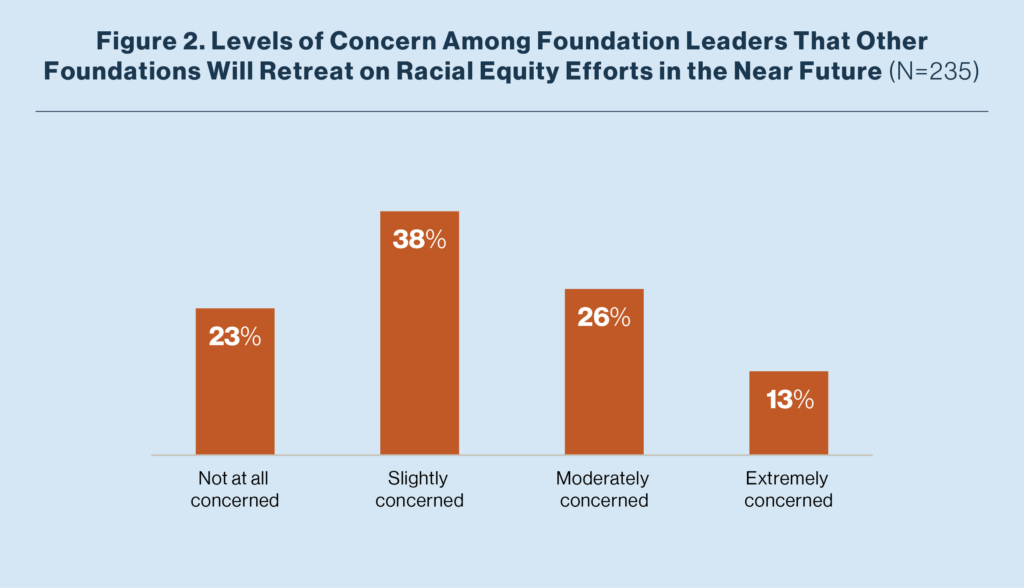In recent years, the U.S. philanthropic sector has faced an increasingly challenging and polarized political landscape. Equity initiatives are experiencing increased scrutiny, with a growing number of political and legal threats to the work of nonprofits and foundations alike. This fall, the Research team at the Center for Effective Philanthropy (CEP) set out to study how the current political climate is affecting the work of U.S.-based nonprofits and foundations — including the funding of racial equity work.
The findings shared in this post are based on responses from 241 nonprofits and 243 foundations between August and October 2024, representing a snapshot of their perspectives during this time period.
Uncertainty, Polarization, and a Shifting Legal Environment
The majority of U.S. based nonprofits and foundations note their work has been affected by the country’s political climate.
About two thirds of both U.S.-based nonprofits and foundation leaders report their organization’s work has been affected by the U.S. political climate in 2024. Nonprofits most frequently indicate that uncertainty related to the 2024 U.S. presidential election and political polarization have affected their work. Political polarization represents the most widespread concern among foundations, with recent judicial rulings and uncertainty about the outcome of the U.S. presidential election not far behind (see Figure 1).

“We are working to find language that doesn’t compromise our values but better communicates with members of the community about what we are working to accomplish with our organizational efforts,” said one nonprofit leader in their response to CEP’s survey.
About a third of nonprofits and foundations report making changes to their work in response to the current political climate. One nonprofit leader cited their organization’s shift to “focusing on providing resources to help grassroots advocates lift their own voices more effectively to policymakers,” while another nonprofit leader described conducting “more education and outreach to remind folks of the historical context of cross-racial and cross-group collaboration, as opposed to the intense polarization we see now.”
Among the foundations that provide examples of changes to their work, some mention increasing their support of efforts to strengthen democracy and bridge ideological divides. “We are doubling down on convening, other forms of civil society work, and building projects that involve diverse participants,” said one foundation leader.
Racial Equity: Foundations Express Concern
Most foundations express some degree of concern that peer foundations will retreat on racial equity efforts in the near future.
The majority of foundation leaders — 77 percent — are concerned that their peers will retreat on racial equity efforts in the near future (see Figure 2). Foundation leaders who identify as people of color are moderately more likely to report seeing this retreat currently happening among foundations compared to leaders who do not identify as people of color. They are also slightly more likely to express concern about foundations retreating on these efforts in the future. In addition, leaders of color are slightly more likely to indicate their foundation funds social justice work.

When asked if their foundation has encountered meaningful resistance to its own racial equity efforts in 2024, just over a quarter of foundation leaders report experiencing resistance from various sources such as their donors, their board of directors, or the local government.
Of the foundation leaders who shared their thoughts on why others may be retreating from providing racial equity funding, nearly half mention fear of backlash or a lack of genuine commitment to racial equity as possible reasons. “For some funders, the initial push for advancing racial equity was reactive and a bit performative — they committed verbally but were not fully prepared or equipped to do the work,” stated one foundation leader.
Another foundation leader noted that “I think these retreats are based more on fear than reality. One or two risk averse trustees may become susceptible to pressure from anti-DEI forces in the community and insist that staff soften their language or stance. We must inoculate our trustees and staff to these reprisals and double down on our good work, rather than doing the work of those opposed to a more equitable world by backing off.”
A Pivotal Moment
The current U.S. political climate presents a pivotal moment for foundations to step up and provide nonprofits with much-needed support to navigate uncertainty and serve their communities. This research finds that both nonprofits and foundations are being impacted by the political climate, and foundation leaders are worried their peers may pull back from funding racial equity efforts moving forward. Our goal is to continue collecting data over time to build a deeper understanding of how the philanthropic sector responds to these complex challenges.
Resources for Funders
The following resources may be useful for funders aiming to learn more about navigating funding decisions in the current political climate.
- Coming Together, Not Apart: How Philanthropy Supports Connection in a Time of Dangerous Division
- A Funder’s Guide to Building Social Cohesion
- Council on Foundations Legal FAQs
- Independent Sector’s Nonprofit Advocacy & Civic Engagement Research
Elisha Smith Arrillaga, Ph.D. is vice president, Research at CEP. Find her on LinkedIn. Emily Yang is a senior analyst, Research at CEP. Find her on LinkedIn.
CEP Research Snapshots are brief, data-informed research publications designed to answer timely, specific questions that are relevant to foundations. This blog post represents the work of CEP’s Research team and includes data collected in two surveys administered between August and October 2024. Find information about the research methodology here.


